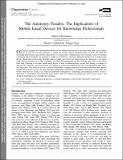The Autonomy Paradox: The Implications of Mobile Email Devices for Knowledge Professionals
Author(s)
Mazmanian, Melissa; Orlikowski, Wanda J; Yates, JoAnne
DownloadYates_The Autonomy.pdf (370.9Kb)
PUBLISHER_POLICY
Publisher Policy
Article is made available in accordance with the publisher's policy and may be subject to US copyright law. Please refer to the publisher's site for terms of use.
Terms of use
Metadata
Show full item recordAbstract
Our research examines how knowledge professionals use mobile email devices to get their work done and the implications of such use for their autonomy to control the location, timing, and performance of work. We found that knowledge professionals using mobile email devices to manage their communication were enacting a norm of continual connectivity and accessibility that produced a number of contradictory outcomes. Although individual use of mobile email devices offered these professionals flexibility, peace of mind, and control over interactions in the short term, it also intensified collective expectations of their availability, escalating their engagement and thus reducing their ability to disconnect from work. Choosing to use their mobile email devices to work anywhere/anytime—actions they framed as evidence of their personal autonomy—the professionals were ending up using it everywhere/all the time, thus diminishing their autonomy in practice. This autonomy paradox reflected professionals’ ongoing navigation of the tension between their interests in personal autonomy on the one hand and their professional commitment to colleagues and clients on the other. We further found that this dynamic has important unintended consequences—reaffirming and challenging workers’ sense of themselves as autonomous and responsible professionals while also collectively shifting the norms of how work is and should be performed in the contemporary workplace.
Date issued
2013-02Department
Sloan School of ManagementJournal
Organization Science
Publisher
Institute for Operations Research and the Management Sciences (INFORMS)
Citation
Mazmanian, Melissa et al. “The Autonomy Paradox: The Implications of Mobile Email Devices for Knowledge Professionals.” Organization Science 24, 5 (October 2013): 1337–1357 © 2013 Institute for Operations Research and the Management Sciences (INFORMS)
Version: Final published version
ISSN
1047-7039
1526-5455